

Charles Derber. Charles Derber is Professor[1] of Sociology at Boston College.
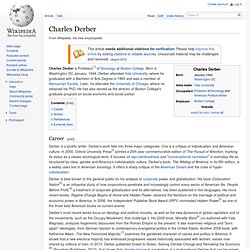
Born in Washington DC January, 1944, Derber attended Yale University, where he graduated with a Bachelor of Arts Degree in 1965 and was a member of Manuscript Society. Later, he attended the University of Chicago, where he obtained his PhD. He has also served as the director of Boston College's graduate program on social economy and social justice. Career[edit] Derber is a prolific writer. Derber is best known to the general public for his analysis of corporate power and globalization. Derber's most recent works focus on ideology and political morality, as well as the new dynamics of global capitalism and of the movements, such as the Occupy Movement, that challenge it.
Derber's newest book,published in 2012, The Surplus American: How the 1% Is Making Us Redundant,[10] co-authored with Yale Magrass, continues Derber's evolution into new genres of political writing. Dan Ariely. Early life and family[edit] Dan Ariely was born in New York City while his father was studying for an MBA degree at Columbia University.
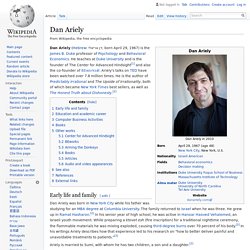
The family returned to Israel when he was three. He grew up in Ramat Hasharon.[2] In his senior year of high school, he was active in Hanoar Haoved Vehalomed, an Israeli youth movement. While preparing a ktovet esh (fire inscription) for a traditional nighttime ceremony, the flammable materials he was mixing exploded, causing third-degree burns over 70 percent of his body.[2] In his writings Ariely describes how that experience led to his research on "how to better deliver painful and unavoidable treatments to patients. Benjamin Zablocki. Benjamin Zablocki (born January 19, 1941) is an American professor of sociology at Rutgers University where he teaches sociology of religion and social psychology.
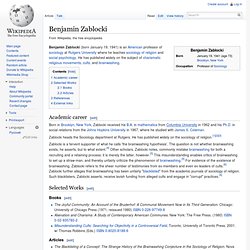
He has published widely on the subject of charismatic religious movements, cults, and brainwashing. Academic career[edit] Born in Brooklyn, New York, Zablocki received his B.A. in mathematics from Columbia University in 1962 and his Ph.D. in social relations from the Johns Hopkins University in 1967, where he studied with James S. Coleman. Zablocki heads the Sociology department at Rutgers.
Zablocki is a fervent supporter of what he calls 'the brainwashing hypothesis'. Rafał Ohme. Rafal Ohme Rafał Krzysztof Ohme (PhD) is a professor of psychology, expert in persuasion and unconscious processes.
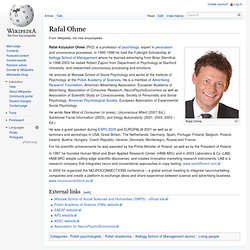
In 1995-1996 he held the Fulbright Scholarship at Kellogg School of Management where he learned advertising from Brian Sternthal. Barbara Ehrenreich. Barbara Ehrenreich (/ˈɛrɨnraɪk/;[1] born August 26, 1941) is an American writer and political activist who describes herself as "a myth buster by trade",[2] and has been called "a veteran muckraker" by The New Yorker.[3] During the 1980s and early 1990s she was a prominent figure in the Democratic Socialists of America.

She is a widely read and award-winning columnist and essayist, and author of 21 books. Ehrenreich is perhaps best known for her 2001 book Nickel and Dimed: On (Not) Getting By in America. A memoir of Ehrenreich's three-month experiment surviving on minimum wage as a waitress, hotel maid, house cleaner, nursing-home aide, and Wal-Mart clerk, it was described by Newsweek magazine as "jarring" and "full of riveting grit",[4] and by The New Yorker as an "exposé" putting "human flesh on the bones of such abstractions as 'living wage' and 'affordable housing'".[5]
G. William Domhoff. George William (Bill) Domhoff (born August 6, 1936) is a research professor in psychology and sociology at the University of California, Santa Cruz.

His first book, Who Rules America? , was a controversial[why?] [citation needed] 1960s bestseller arguing that the United States is dominated by an elite ownership class, both politically and economically.[1] In the early 1960s, Domhoff was an Assistant Professor of Psychology at Los Angeles State College. Daniel Dennett. Daniel Clement Dennett III (born March 28, 1942)[1][2] is an American philosopher, writer, and cognitive scientist whose research centers on the philosophy of mind, philosophy of science and philosophy of biology, particularly as those fields relate to evolutionary biology and cognitive science.[3] Early life and education[edit] Dennett was born on March 28, 1942 in Boston, Massachusetts, the son of Ruth Marjorie (née Leck) and Daniel Clement Dennett, Jr.[6][7] Dennett spent part of his childhood in Lebanon, where, during World War II, his father was a covert counter-intelligence agent with the Office of Strategic Services posing as a cultural attaché to the American Embassy in Beirut.[8] When he was five, his mother took him back to Massachusetts after his father died in an unexplained plane crash.[9] Dennett says that he was first introduced to the notion of philosophy while attending summer camp at age 11, when a camp counselor said to him, "You know what you are, Daniel?
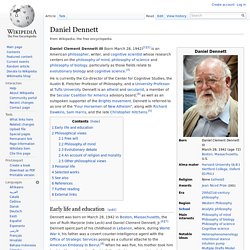
First ... Mark Schaller. Robert Cialdini. Robert B.
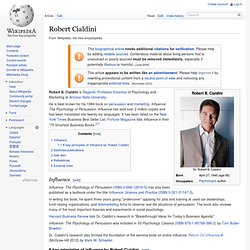
Cialdini is Regents' Professor Emeritus of Psychology and Marketing at Arizona State University. Jerry Fodor.